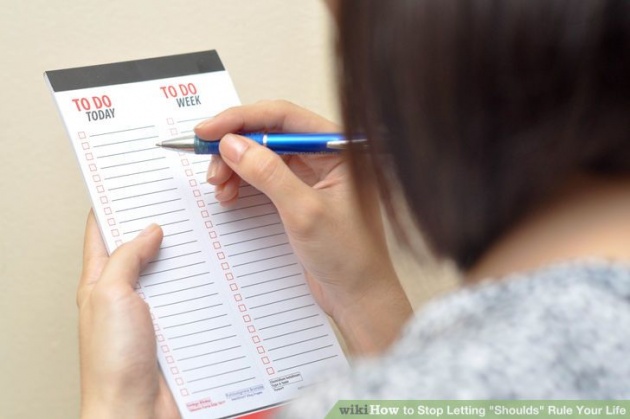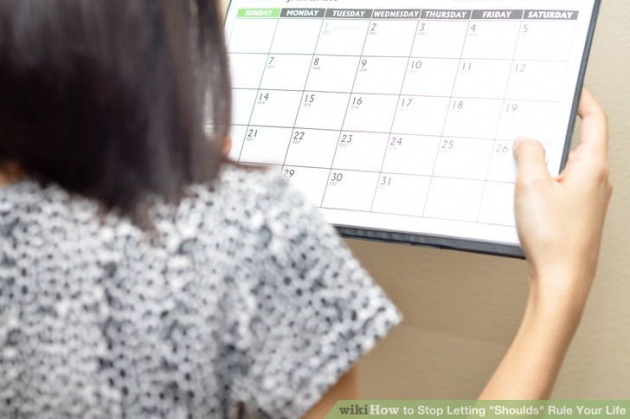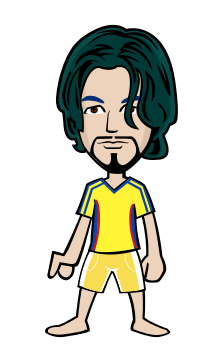How to Stop Letting "Shoulds" Rule Your Life
Questions and Answers
Do you spend much of your life telling yourself what you "should" do? "Shoulds" are about obligation, habit, and worst of all, other people's expectations. Living a life thinking you should do things is a life half lived and fully hemmed in by the ways things ought to be instead of the way things are. This results in frustration, unhappiness, and never being content with yourself. While it is important to strive to be the best you can be, it is also important to accept what is and to accept yourself for who you are without coloring this through other people's expectations. Break free from the unhappy world of "shoulds", especially if you're thinking "I should be doing X, Y, Z right now".
Steps

1
Write down the things you think you should be doing today, tomorrow, next week. Be honest and cover such "shoulds" as "I should lose weight", "I should have a better job", "I should have tried harder in that test", "I should stop being so negative", "I should read more", "I should spend less time online", "I should be more organized", and so forth. Don't hold back on any shoulds that are currently bugging you; after all, they are surfacing because they are driving you right now.

2
Read back through your list. This time, ask yourself the simple question: "Why should I?" Be sure to write down the first answer that comes to mind for each item on your list. The point of this exercise is to bring you to a conscious state of questioning your "shoulds", to see as much as you can for yourself, where the origins of these should obligations are coming from, as well as how important they really are in the bigger scheme of things.

3
Reflect upon the answers you have given. Some of the answers may well shock you, such as an answer to "Why should I lose weight" being "because I'm ugly and unlovable". That tells you rather a lot more about what's lying behind that should than simply a case of lacking the self-discipline to eat less; it's suggesting you have major self-esteem issues in relation to not being able to love your body and being unwilling to nourish it with love. As for an answer that brings another person into the equation, such as "Because my parents/teacher/boss/editor said I should", this shows that the expectation is from somewhere else and not from within you. With an answer like this, it's time to ask yourself whose tune are you dancing to, and whether you have a habit of allowing yourself to be influenced in this way, thereby losing your own sense of self and perspective.

4
Understand what lies behind a "should". Whenever you tell yourself (or others for that matter) that you "should" do something, what you're really doing is expressing a reluctance to make a much-needed change in your life that involves you being in control of both the change, the journey, and the outcome. "Shoulds" also mask fear and guilt - fear of change, fear of failure, and guilt about not living up to other people's expectations. The truth behind all of this is that a "should" way of thinking holds you back while at the same time is a subconscious recognition that you're doing the wrong thing by yourself but you're not willing to change it… yet.

5
Allow yourself the possibility of changing and moving forward in the direction you'd rather be taking. Return to the list you created earlier. This list says a lot about the person you'd rather be, the one who is inside you waiting to shine forth, as well as the one who would like to cast aside other people's expectations and create your own instead. This time, go down your list and rewrite it with: "If I really wanted to, I could...". This simple shift in thinking will transform your focus from being a victim of "should" to being empowered by being a decision-maker ready to make changes as needed. Other questions you can ask yourself include:
What truly matters to me right now?
Who do I truly believe is worth taking advice from/being inspired by? Everyone else's words are simply chatter.
How do I want to live my life? What are my values?
Are these expectations I place upon myself going to bring about the changes I want to see in the world? Is there a better way than this? (Then seize it!)
6
Get active. Once you've changed your approach from should to could, do it. Thinking alone doesn't make things happen but as your "should syndrome" has shown, it can stop you from actively doing something to improve your life. Quit over-thinking things and start doing the things that you could be doing; the more you think about doing it, the more you're complicating it, so dive in and try. Set some deadlines for both making a decision and for doing the thing you could be doing.

7
Practice gratitude and acceptance. Being grateful for what you do have in life and accepting of the talents and abilities you have now is a brilliant way to chase off the "should" syndrome. Try being grateful for something every day and letting that feed back into your entire sense of well-being. Accept that some things cannot be changed and only seek to change those which you can personally impact.



